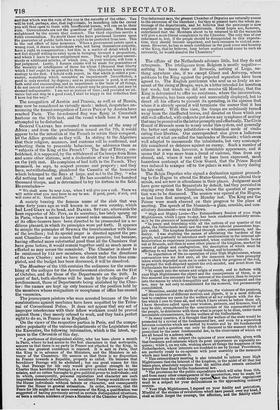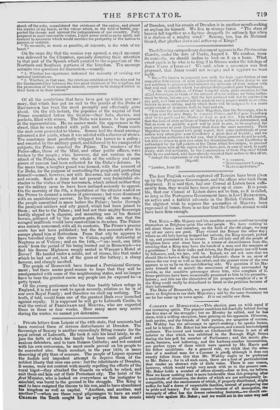The. affairs of the Netherlands advance little, but they do
not retrograde. The intelligence from Belgium is mostly negative— nothing has been done at Brussels, nothing at Liege, no- thing anywhere else, if we except Ghent and Antwerp, where petitions to the King against the projected separation have been agreed to. The English gentleman who sent us so lively an ac- count of the rising at Bruges, says, in a letter intended for insertion last week, but which we did not receive till Monday, that the. King is determined to offer no resistance, where the insurrection, as at Brussels, has been openly and successfully displayed, but to direct all his efforts to prevent its spreading, in the opinion that where it is already spread it will terminate the sooner that it has no opponent. With this view, the troops are sedulously turned away from the disaffected towns, and directed on those which are still well-affected, with orders to put down any symptoms of mutiny that maybe perceived in the latter promptly and effectually. The Civic Guard of Brussels seem to weary under this system, and generally the better sort employ substitutes—a whimsical mode of vindi. eating their liberties. Our correspondent also gives a ludicrous- account of what are called the barricades of Brussels ; -which seem well adapted to incommode the inhabitants, but very contempt- ible considered as defences against an enemy. Such a number of citizens in arms has, however, a formidable appearance, and it seems that it was more from a dread of violence, than from any absurd, and, where it was said to have been expressed, most hazardous contempt of the Civic Guard, that the Prince Royal was induced to scamper off to the palace in such a hurry during his late visit.
The Belgic Deputies who signed a declaration against proceed- ing to the Hague to attend the States-General, have altered their minds, and are now in attendance in their places. Judgment must have gone against the Separatists by default, had they persisted in staying away from the Chambers, where the question of separa- tion was to be discussed. The session was opened at the Hague, as had been first arranged, on Monday last. The King and the Prince were much cheered on their progress to the place of meeting. The speech of the Monarch—a plain, sensible, and con- ciliatory document—was as follows.
" High and Mighty Lords—The Extraordinary Session of your nigh Mightinesses, which I open to-day, has been rendered absolutely neces- sary by the pressure of lamentable events. " In peace and friendship with all the nations of our quarter of the
globe, the Netherlands lately saw the war in its colonial possessions hap- pily ended. The kingdom flourished through order, commerce, and in- dustry. I was studying the means of alleviating the burdens of the people, and gradually to introduce such ameliorations in the internal ad- ministration as experience ;recommended, when suddenly tumults broke out at Brussels, and then in some other places of the kingdom, marked by scenes of pillage and conflagration, the description of which must be afflicting to my heart, to the national feeling, and to humanity. " In expectation of the co-operation of your High Mightinesses, whose convocation was my first care, all the measures have been promptly taken which depended upon me in order to check the progress of the evil, to protect the well-disposed against the evil-minded, and avert from the Netherlands the horrors of civil war. "To search into the nature and origin of events, and to fathom with
your High Mightinesses the object and the consequences of them, is at- this moment less necessary for the interest of the country, than to inquire into the means by which tranquillity and order, the government and the law, may be not only reestablished for the moment, but permanently consolidated.
" Meantime, amidst the strife of opinions, the violence of the passions,
and the existence of different motives and objects, it is a most difficult task to combine my cares for the welfare of all my subjects with the du- ties which I owe to them all, and which I have sworn to before them all.. I have therefore called upon your wisdom, patience, and firmness, that I may be able, strengthened by the concurrence of the representatives of the people, to determine with them what is proper to be done, under these lamentable circumstances, for the welfare of the Netherlands. " In many quarters, it is thought that the welfare of the state would be promoted by a revisal of the fundamental law, and even by a separation between countries which are united by treaties and by the fundamental law ; but such a question can only be discussed in the manner which is prescribed by the same fundamental law, to the observance of which we are all bound by a solemn oath. " I require on this subject the opinions of your assembly, given with that frankness and calmness which its great importance so especially re- quires; while I, on my side, wishing above all things the happiness of the i
Netherlanders, whose interests are confided to me by Divine Providence, am perfectly ready to co-operate with your assembly in the measures which may tend to promote it. ts-
" This extraordinary meeting is also intended to inform your High Mightinesses that the interest of the kingdom, in the midst of all that has taken place, absolutely requires that the militia shall remain embodied beyond the time fixed bythe fundamental law.
The provisions for the public expenditure which will arise from this,
and from many other consequences of the Wsurrection, may be made for the present from the credit already openedbut the further regulations must be a subject for your deliberations in the approaching ordinary session. " Your High Mightinesses, I depend on your fidelity and patriotism. Mindful of the storms of revolutions which have passed over my head, I shall as little forget the courage, the affection, and the fidelity which shook off the yoke, consolidated the existence of the nation, and placed the sceptre in my hands, as the 'valour which, in the field of battle, sup- ported the throne and secured the independence of our country. Fully prepared to meet reasonable wishes, I shall never yield to party spirit, nor consent to measures which would sacrifice the prosperity of the nation to passion or violence.
" To reconcile, as much as possible, all interests, is the wish of my heart."
On the same day that the session was opened, a royal message was delivered to the Chamber, specially directing their attention to that part of the Speech which pointed to the separation of the Northern and Southern portions of the kingdom. The message submits two questions for discussion,—namely,
" 1. Whether has experience indicated the necessity of revising our national institutions.
" 2. Whether, in that case, the relations established by treaties and by the fundamental law between the two great divisions of the kingdom, for the promotion of their common interest, require to be changed either in their form or in their nature."



























 Previous page
Previous page